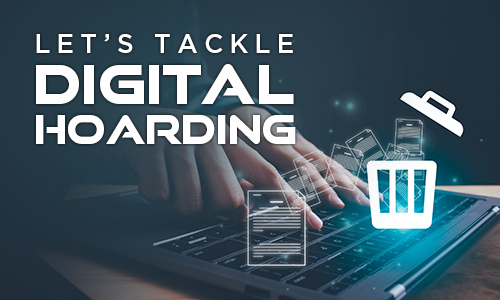OIT News
From the CIO: The Rising Cost of Digital Hoarding

As horrible as it may sound, or the images it may conjure up, saving unnecessary, outdated files is something that most of us are guilty of. Moreover, various digital storage providers, including OIT, encouraged this behavior by making storage cheap and easily accessible – even giving it away for free. Many of us in our personal and professional lives have hundreds, if not thousands, of files sitting in storage, either in the cloud or on OIT storage devices and systems, that we have not touched in years. Storage providers are aware that many of us have not been curating our file collections, so they have figured out a way to encourage us to do so. They are raising prices and cutting quotas. No surprise there, I suppose – money is a motivator – but it does negatively impact our budgets.
To address these rising costs, OIT will work with the community to help better manage storage. Whether through archiving, educating on less expensive storage options, or eliminating some storage options, we as a community will have to come to terms with the fact that just like closet space, digital storage can and will fill up with “junk” and need to be cleaned out.
Read more below as we will feature various storage options you may not know about that may be more appropriate and cost-effective than what you are using now. In the meantime, look at your files and determine if anything should be deleted, such as multiple drafts of the same document, multiple copies of the same document, photos that have gone unviewed, and backups of backups.
Options and Ideas for Managing Your Digital Files — Let’s get started!
Digital Hoarding Part II: Where to start
March 4, 2024
We recently started the conversation about the rising cost of digital hoarding and challenged you to think about what you are holding on to that you may no longer need. As you start the process of cleaning up your files and folders, we recommend reading the university’s policy for records retention.
We know that some of your files may not fall under the records retention policy. However, you start by cleaning up duplicate copies of files and older documents that are collecting dust and haven’t been opened in years. If you have personal files stored in your UT accounts, we recommend moving them to a consumer solutions or personal external hard drive.
Digital Hoarding Part III: Spring Cleaning
March 18, 2024
As we continue our discussion on digital hoarding, we want to provide you with some guidance on how to get started. Kick-start your digital clean-up by following these suggestions to help evaluate and decide which files to delete:
- Empty the Recycle Bin or Trash folder before starting your clean-up.
- Check for the largest and oldest documents by folder and remove any you no longer need.
- Remove redundant and outdated versions.
- Review your Downloads folder for old installers, obsolete documents, and temporary files.
For technical help and detailed instructions with locating, searching, and deleting files in Google Drive or Microsoft OneDrive, we recommend visiting the OIT Knowledge Base.

 Explore
Explore Write
Write Chat
Chat Call
Call